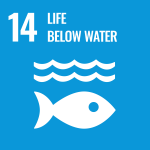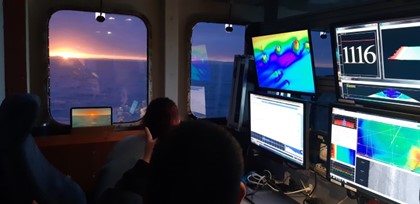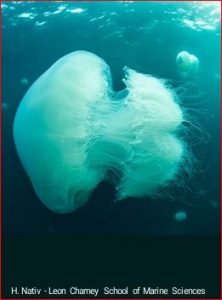 Goal 14: Life below Water
Goal 14: Life below Water
CONSERVE AND SUSTAINABLY USE THE OCEANS, SEAS AND MARINE RESOURCES FOR SUSTAINABLE DEVELOPMENT
Research
The Leon H. Charney School of Marine Sciences (CSMS) is home to Israel’s first university graduate school of marine sciences. CSMS is based on a multidisciplinary and interdisciplinary approach that is essential to address the challenges of the dynamic marine ecosystem under climate change. Our mission is to provide science- based insights that support proactive policy generation and regulatory activity.
Our investigators explore the physical, chemical, and biological environment of the Mediterranean and Red Seas. The research spans topics such as mapping the seafloor; exploring of the sub-sea floor for methane seeps (a powerful greenhouse gas); predicting future tsunamis from past evidence; studying the impacts of climate change and pollution on the marine food web; and discovering never before seen nurseries of deep-sea sharks and Mediterranean corals.

Partnering with Texas A&M University, we established the THEMO project (Texas A&M – University of Haifa Eastern Mediterranean Observatory) – two sensor arrays attached to surface buoys at two locations off the Israeli coast (125 m and 1500 m depth stations).  These observatories provide real time information of the physical, chemical, and biological status of the seawater. The data is received at a shore station and displayed on the THEMO website where anyone can track and download the data.
These observatories provide real time information of the physical, chemical, and biological status of the seawater. The data is received at a shore station and displayed on the THEMO website where anyone can track and download the data.
Public Engagement
The 7th Haifa Conference on Mediterranean Sea Research- “Food from the Sea – Towards 2050 and beyond,” discussed how fish, seafood and seaweed are likely to be a major source of nutrition for the anticipated 9-10 billion people that will inhabit our planet. By the middle of the 21st century, most of the fish and shellfish that reach world markets will originate from aquaculture and will most likely be based on seawater production systems, whether from land-based facilities or oceanic production farms. Marine aquaculture in the eastern Mediterranean must provide sustainable production of cost effective, nutritious, healthy food products.
Jellyfish Inc. began as a purely scientific endeavor, however due to the patchy and often unexpected appearance of jellyfish at sea, scientific researchers recognized the need to enlist the public in their efforts. Faculty from the Leon H. Charney School of Marine Sciences and the Recanati Institute for Maritime Studies established a citizen-science  website to enable the public to report observations of jellyfish in the eastern Mediterranean, as well as inform people about the gelatinous plankton in our coastal waters.
website to enable the public to report observations of jellyfish in the eastern Mediterranean, as well as inform people about the gelatinous plankton in our coastal waters.
Learning & Students
Marine Sciences graduate students who enrolled in the our new outreach focused course – Sea, Society, Education and Leadership – worked with underprivileged middle school students on projects highlighting the importance of a sustainable sea.
Operations
An action plan for reducing plastic waste on campus was presented to the University’s committee on Environmental Management in October 2020. The plan included disposable plasticware reduction goals for on-campus eateries, as well as a dramatic increase in the number of large receptacles for recycling plastic bottles.
In order to reduce the consumption of water on campus, our smart drip irrigation systems are monitored regularly so that any irregular water usage will be detected and dealt with in real time. In addition, campus gardens are becoming less reliant on water as a result of a deliberate shift to drought tolerant vegetation.

